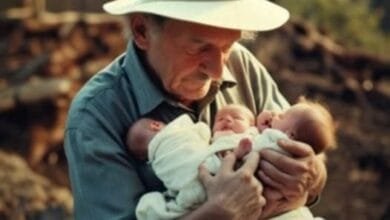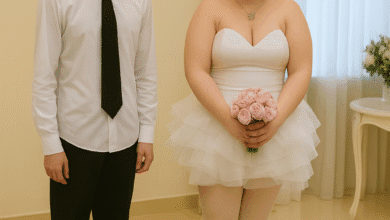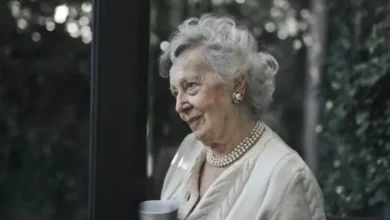The Mysterious Guest

For six years, Emily, a kind-hearted young baker, performed the same quiet act every morning: she left a warm meal beside a bus stop bench where a homeless man sat in silence. She never asked his name. He never said much—just a nod of thanks. There were no conversations, no questions, no judgments—only quiet compassion.
That Saturday morning smelled of cinnamon and rain—scents that always accompanied Emily’s most important days. And today was the biggest of them all: her wedding day.
The old church in downtown San Diego glowed with sunlight streaming through stained glass, casting vibrant colors on polished pews and white floral arrangements. Guests were arriving—chatting softly, scrolling through their phones. It looked like a perfect wedding.
Until the murmurs started.
“Did you see that man?” whispered one woman. “He looks… homeless.”
At the end of the aisle stood a man with a straight posture but shoulders weathered by life. He wore a worn-out suit—too old for the occasion, clearly out of place. His shoes were scuffed but neatly shined. His hands trembled slightly as he held a folded card. No one had seen him enter. No one recognized him.
Or so they thought.
The whispers grew louder.
“Surely the bride didn’t invite him…”
“He must be confused. Should someone call security?”
Behind a decorative screen near the bridal suite, one of the bridesmaids peeked out and froze. “Emily… I think it’s him.”
The bride paused.
She had just finished adjusting her veil in the mirror, her hands still dusted with flour from her personal tradition—baking a single pastry before every major life event. Just one. A habit born not from superstition, but from memory.
She turned slowly. “Him?”
The bridesmaid didn’t answer. She didn’t have to.
Emily’s heart raced. The room fell too quiet. Even the rustle of her dress sounded like thunder.
Outside, the whispers turned into questions.
“Does she know him?”
“Why is he just standing there?”
And then—before the organ could begin, before the guests could decide whether to intervene or look away—a distant rumble broke the silence. Tires on gravel. Doors opening in perfect sync. Boots hitting stone.
Twelve men entered.
Their uniforms gleamed in the morning light—U.S. Marine dress blues, white gloves, rigid posture. They moved in perfect formation, each step echoing with discipline and meaning. The guests sat frozen in awe.
One man stepped forward.
He wore a silver bar on his collar and carried an air of certainty. His voice was steady as he said,
“We’re here for the bride.”
No one breathed.
The man with the folded card slowly stepped forward. As he passed the pews, guests lowered their eyes—not in shame, but in respect.
He reached Emily, who now stood near the altar, her breath caught in her throat.
With a trembling voice, he spoke:
“You fed me for six winters. You never asked my name. You never judged me. Today, I return the favor.”
He handed her the card. Inside, a simple message was written:
“No kindness goes unnoticed. With gratitude, Retired Sergeant Thomas Grey. At your service.”
Behind him, the twelve Marines raised their swords in salute, forming a ceremonial arch—a tribute to the bride who once gave warmth to a stranger and unknowingly touched a forgotten soldier’s heart.
From that moment on, no one dared ask again:
“Who invited him?”
Because everyone knew the answer.





